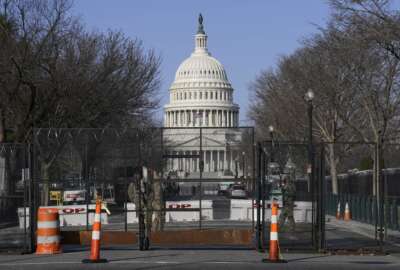
An agenda for Congress on oversight, transparency and ethics
The Project on Government Oversight, or POGO, has delivered to the new Congress a new set of legislative recommendations
Best listening experience is on Chrome, Firefox or Safari. Subscribe to Federal Drive’s daily audio interviews on Apple Podcasts or PodcastOne.
When it comes to oversight, transparency, and consistent ethics in government, you can never rest on your laurels. That’s why the durable Project on Government Oversight, or POGO, has delivered to the new Congress a new set of legislative recommendations for those very qualities. With highlights, POGO’s director of public policy, Liz Hempowicz, joined Federal Drive with Tom Temin.
Interview transcript:
Tom Temin: Liz, good to have you back.
Liz Hempowicz: Great to be here with you.
Tom Temin: So tell us about this list, this biennial list that you put out, there’s so much to be thought of these days in this whole area of transparency, oversight ethics. Where do you begin?
Liz Hempowicz: We call it our baker’s dozen, because we try to fit all our recommendations. This one has 91 individual recommendations, but we try to fit them under 13 broad umbrellas of policy areas. Some of them are long legacy issues of POGO, so smart defense spending, transparency and government decision making, increasing whistleblower protections and protecting inspectors general from political interference. But then there’s also a couple of newer areas for us. So one in particular is really taking a very critical look at the structure for individuals to push back or to be made whole after the government has deprived them of constitutional rights. And so this is both in the context of non citizens, where we’re seeing expedited removal procedures and real lack of access to due process that is promised to non citizens under the Constitution, the fifth and fourteenth amendments apply to citizens and non citizens alike. But we’ve seen a lot of changes in the immigration system that really undermined those due process protections. But also we were looking at issues like qualified immunity and the lack of legal remedy to sue the federal government, if they have deprived you of your rights. It is a lengthy to do list. It’s certainly POGO’s to do list for the next couple of years, these are the issues that will really be focused on, but I’m really hoping that Congress and the White House will take a look at it and kind of make it their to do list as well.
Tom Temin: Now, for the first time, you do have executive action recommendations, in addition to legislative. I wish I had the pen contract for the White House, because there has been a large volume of them. And it seems like there’s a big box of pens there every time the President signs, one, maybe one letter per pan or something. But what are some of the executive actions? Is there anything left yet that he has not done so far?
Liz Hempowicz: Yeah. And I guess one thing I should specify is that when we’re talking about executive action, we’re not necessarily talking about executive orders, right. Some of these are things that the White House can just direct agency heads to do. So one in particular that I think I’ve talked with you about before is the Office of Legal Counsel over at the Department of Justice. It’s this office that operates without a lot of transparency but issues opinions on legal issues of the day that are considered binding on the executive branch. And so really, this office that is not subject to transparency requirements they don’t really release information under the Freedom of Information Act, they get to decide, it’s at their discretion, which ones of their opinions they make public. So really, what we’re talking about is an office that really promulgate secret law. And so one of our recommendations, right, is that the President can direct the Attorney General to publish all these opinions unless they deal with classified information. So that’s something that you don’t need an executive order to do.
Tom Temin: That idea of secret law being issued in secret, there’s probably nothing more corrosive to faith and trust in the government than that kind of activity.
Liz Hempowicz: Absolutely. Absolutely. And I think in a similar vein, there’s also the Office of Management and Budget within the White House that issues also secret opinions that concern apportionment. And so they make these decisions about specifically how to spend money that Congress has appropriated, but they don’t do so with transparency. And I think this came up during President Trump’s first impeachment where we were talking about withholding aid that Congress had appropriated to go to Ukraine, and this all came out of the Office of Management Budget, they made a decision not to release that aid. And so we’re talking about is, I think, really, we take a step back. I know I’m the one who threw out OMB and apportionment, but really what we’re talking about is Congress maintaining control of the power of the purse, which is a fundamental part of our constitution in our system of government.
Tom Temin: And some of the issues you bring up — protecting whistleblowers, supporting effective independent internal watchdogs — I guess that isn’t most of the work done on those particular issues?
Liz Hempowicz: I wish, I wish.
Tom Temin: Not too many people laugh out loud at my questions.
Liz Hempowicz: I know, you must be joking, because you’ve read POGO’s work. I think in the whistleblower space, it’s a real dire situation for whistleblowers right now, for federal whistleblowers, for a couple reasons. One is that the legal protections that they’re offered are not affirmative protections. Yes, there is a legal prohibition against retaliating against whistleblowers. But really, the way the legal structure of these protections is set up is that it just creates an avenue for individuals to try to enforce those protections after they’ve been retaliated against. And I would be remiss not to highlight that the bureaucratic agency that almost all title five, which is like the most rank and file federal employees, the agency that they have to go to to enforce their legal protections hasn’t had a single member in two years, hasn’t had a quorum in four years. And so there’s a backlog of over 3000 cases. But really, these whistleblowers are stuck in what I’ve been referring to as bureaucratic purgatory, because they can’t go to court. And so one of the big things that we’ve been pushing is that they should have access to jury trials. Federal whistleblowers are the only segment of the labor force that can’t have their employment disputes, heard by a jury of their peers. And I have a feeling that once they are granted this access to jury trials, and I believe it will happen, and I’m hoping it’ll happen this Congress, I think what we’ll end up seeing is much more favorable case law in whistleblowers favor.
Tom Temin: Okay. Let me ask you about this one, reasserting congressional power. Because it seems that each president stretches the bounds of executive privilege. I mean, when I was young, the word imperial presidency came into vogue. And that’s eight or nine presidents ago. And here we have what really is an imperial type of presidency. And so how can Congress get its own power back, which it has already under the Constitution, it is the first branch of government?
Liz Hempowicz: Congress in the legislative branch is arguably intended to be the most powerful actor in the system, right, because they are the body that is supposed to be most accountable to the people they represent. And as you mentioned, we’ve seen power between the legislative and executive branch grow steadily unequal, and really heavily in favor of the executive branch. I would say, just to go back to what we were talking about earlier, the Office of Legal Counsel, I think that’s where a lot of this comes from. They’re the office that interprets executive power. And they have a real bent slash bias towards the executive branch and increasing their powers. So a couple areas that we’ve highlighted in that section of the baker’s dozen are how Congress should rebalance authority in how the executive branch exercises, emergency powers, which have been delegated to the president into the executive branch by Congress. And so I think this came up most famously when President Trump declared a national emergency at the southern border to build the border wall, right after Congress considered appropriating money to it and decided not to. And so this was probably as clear of a rebuke to Congress’s power of the purse as you were going to get under the National Emergencies Act. And then despite broad bipartisan pushback in Congress, they weren’t able to reach that veto proof threshold to overturn the President’s action. And part of that is just the way the law has evolved since the National Emergencies Act went into effect, has really favored the executive branch. And so we’re long past time for Congress to kind of flip that. And our recommendation there has been rather than asking Congress to affirmatively overturn the President’s decision, it should be the president has access to these emergency authorities for a brief period of time without congressional authorization. And then, after 30 days, Congress can either vote to extend the emergency or not. And then really, by doing that, and flipping it so that it doesn’t require a veto proof majority to overturn the President’s action, you make it much easier for Congress to have its voice heard.
Tom Temin: And let me ask you this, POGO is one of the more senior of these types of organizations in Washington that looks at this kind of thing. I think you’d go back to sometime around 1982 or so. There’s no shortage of people throwing things in Congress these days. How do you get heard? Is it possible to get heard above above the crowd here?
Liz Hempowicz: Uh, well, we’re persistent. I think one of the benefits, POGO has been around for 40 years now, and we have a really good reputation. We are a nonpartisan organization that is really committed to the principle of non partisanship. And so we have relationships across the aisle and offices know that when we’re making policy recommendations, it’s not based off of kind of the news of the day, it’s really based off of what we’re seeing currently, yes, but also what we’ve seen over the last 40 years. I think, especially when we’re talking about whistleblower protections, we’re an organization that was founded by whistleblowers, and so they’ve been such a central tenant to what we do, and how we think about our work, that we have the benefit of just kind of this very long history of working in this space very closely and paying very close attention. And I think one thing that the general public misses sometimes when we’re talking about Congress is that the staffers that work for these members of Congress have extremely large portfolios, and it’s very difficult to become a true expert in every issue you are expected to, to staff your boss on. I mentioned that I see this kind of list as a to do list for Congress. But really, we also just want to serve as a resource to these staffers who haven’t had the benefit of working on these issues for decades. We can talk to them and explain to them why we’ve seen the changes in the law made, what was happening at that time and really bring that benefit of that experience.
Tom Temin: Liz Hempowicz is Director of Public Policy at the Project On Government Oversight. As always, thanks so much.
Liz Hempowicz: Thank you. Thanks for having me.
Copyright © 2025 Federal News Network. All rights reserved. This website is not intended for users located within the European Economic Area.
Tom Temin is host of the Federal Drive and has been providing insight on federal technology and management issues for more than 30 years.
Follow @tteminWFED
Related Stories

Opportunity to reskill federal workforce for AI jobs ‘underutilized,’ panel warns Congress




